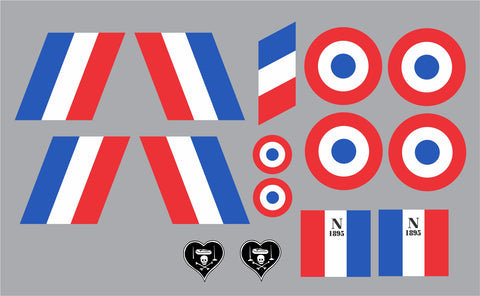Charles Eugene Jules Marie Nungesser was born in Paris on the 15th of March, 1892. He was France's third leading ace with 45 victories.
When World War I broke out Nungesser joined the Second Hussars. While on patrol one day, Nungesser and several fellow soldiers, stopped a German staff car, shot the occupants, and drove back behind their lines. His superiors were so impressed, they gave him the car and the Medaille Militaire. At this time Nungesser requested and was approved for a transfer to the Service Aeronautique. He received his brevet March 2, 1915.
Nungesser shot down his first plane, an Albatros, when he left his field without permission. He was awarded the Croix de Guerre and given eight days in house arrest. After this he requested to be sent to a fighter group and this was granted at the end of 1915.
While there, he did a bunch of wild flying over the nearby town, and many people complained. The commander of the squadron told Nungesser that he was going to do aerobatics, do them over the German lines. Nungesser jumped into his plane, flew to the nearest German field, and gave them quite a show. He reported back to his commander, told him what he did and was put under arrest again.
In January 1916, Nungesser had a very bad crash, breaking both legs, piercing the roof of his mouth with the planes control stick, and dislocating his jaw. His wounds were nursed back to health and he started flying again, March 29, 1916. One leg did not heal properly, so he underwent surgery and insisted that no anesthesia be given him. During his fighting career, he was wounded many times. He had many internal injuries, a scull fracture, concussion, fractures of the upper and lower jaws, dislocated wrist, clavicle, and ankle, cuts, bruises, and the loss of his teeth.
Nungesser became a member of the Lafayette Escadrille, and got into a fierce competition with Rene Fonch. Nungesser's mechanics would carry him to his plane so he could fly. After his patrol, they would carry him back to the hospital. Because of his repeated hospital stays, Nungesser slowly lost ground in the contest and Fonch finished the war with 75 downed aircraft.

